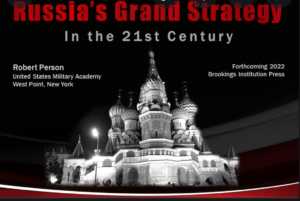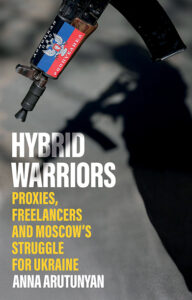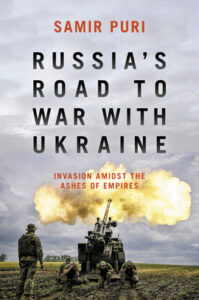Authoritarian regimes create incentives for officials to shelter leaders from the truth, especially bad news, as we can see in Russia, said Celeste Wallander, assistant secretary of defense for international security affairs.
Such systems “do not have the sometimes troublesome but always constructive feedback mechanisms of democracies. You can’t make good decisions if you don’t have good information,” she told the Center for Strategic and International Studies (above). “And, you can’t have good information if you don’t have a variety of views and the ability to question yourself and reassess and course correct.”
 Ukraine’s current offensive in the south “will be a major defeat for Russia because it means it pushes back even more Russia’s ambition to take Odesa, which was one of the stated objectives earlier this year,” said Wallander. “It becomes that much harder, and it gives Ukraine a much better defensive position to ride out what probably will be a tamping down of the hot fighting over the winter.”
Ukraine’s current offensive in the south “will be a major defeat for Russia because it means it pushes back even more Russia’s ambition to take Odesa, which was one of the stated objectives earlier this year,” said Wallander. “It becomes that much harder, and it gives Ukraine a much better defensive position to ride out what probably will be a tamping down of the hot fighting over the winter.”
Over the last two decades, she added, Russian President Vladimir Putin has created a “rigid, brittle structure in which only the like-minded succeed; in which he is surrounded by people who think the way he does and anyone who was willing to stick their head up and say, ‘maybe that’s not a good idea,’ has found themselves, at best, being fired.”
Gradually, then suddenly
 If Putin’s iron grip on Russia is shattered by mass protest one day, it will likely emerge suddenly and unexpectedly but appear inevitable in retrospect, says analyst Robert Person, author of the forthcoming Russia’s Grand Strategy in the 20th Century. In a seminal 1991 article, Timur Kuran proposed an innovative model for understanding how the wave of anticommunist mass uprisings that swept across Eastern Europe in 1989 came out of nowhere yet seemed inevitable in retrospect, he writes for the Journal of Democracy:
If Putin’s iron grip on Russia is shattered by mass protest one day, it will likely emerge suddenly and unexpectedly but appear inevitable in retrospect, says analyst Robert Person, author of the forthcoming Russia’s Grand Strategy in the 20th Century. In a seminal 1991 article, Timur Kuran proposed an innovative model for understanding how the wave of anticommunist mass uprisings that swept across Eastern Europe in 1989 came out of nowhere yet seemed inevitable in retrospect, he writes for the Journal of Democracy:
Kuran noted that it is difficult to judge the true level of regime support in a dictatorship based on lack of public dissent. This is because of preference falsification: Citizens may act publicly as if they support the regime, while privately holding antiregime beliefs. ….But each citizen has a unique “revolutionary threshold” or breaking point at which they are fed up enough to step into the streets in protest. …Events can unexpectedly and rapidly lower the thresholds of a wide swath of society to act, setting in motion a cascade that can bring millions into the streets in the blink of an eye.
Though many in the West hope that Putin’s military mobilization unleashes a massive wave of pent-up dissent, Kuran’s model reminds us that humility is warranted, Person suggests.
 In Russia, a truculent, grievance-filled nationalism under Putin and an authoritarian style of rule contrasted with a lively, if imperfect democracy in Ukraine and a society learning to be proud of its national culture and statehood. Two new books, written by authors with first-hand experience of conditions in Ukraine, do a fine job of placing the war in its larger historical, geopolitical and social contexts, the FT’s Tony Barber writes:
In Russia, a truculent, grievance-filled nationalism under Putin and an authoritarian style of rule contrasted with a lively, if imperfect democracy in Ukraine and a society learning to be proud of its national culture and statehood. Two new books, written by authors with first-hand experience of conditions in Ukraine, do a fine job of placing the war in its larger historical, geopolitical and social contexts, the FT’s Tony Barber writes:
- Anna Arutunyan, a Russian-American specialist on postcommunist Russia and Ukraine, concentrates in Hybrid Warriors on why fighting erupted in Ukraine’s Donbas region in 2014…She contends that it oversimplifies matters to portray the Kremlin as the exclusive instigator of the separatist insurgency of 2014. “In a general sense, this is largely accurate. However, it misses . . . the extent to which local [pro-Moscow] separatists and the Russian non-state fighters and activists who initially came to fight alongside them shaped the insurgency and the war it sparked….They represented “the private and the rightwing sector of [Russian] civil society . . . businessmen, think tanks and independent political activists coalesced around an imperialist agenda”.
 Samir Puri, a war studies lecturer and former UK diplomat, pays close attention in Russia’s Road to War with Ukraine to the larger international setting of Ukrainian-Russian hostilities… Puri, author of The Great Imperial Hangover, comments that for 500 years Russia has had little experience of not being an empire. … Coupled with Russian population movements into Donbas and other areas, this surely made it easier for Putin to think of postcommunist Ukraine as an “errant province”, not a sovereign state.
Samir Puri, a war studies lecturer and former UK diplomat, pays close attention in Russia’s Road to War with Ukraine to the larger international setting of Ukrainian-Russian hostilities… Puri, author of The Great Imperial Hangover, comments that for 500 years Russia has had little experience of not being an empire. … Coupled with Russian population movements into Donbas and other areas, this surely made it easier for Putin to think of postcommunist Ukraine as an “errant province”, not a sovereign state.
Russia’s Transformational Failure
In the early 1990s, the political scientist Claus Offe explained the nature of the unique challenges faced by countries across the post-communist region, which he called the triple transformation: the political transition from autocracy to democracy; the economic transition from planned to market economy; and a national transition from empire to nation-building. While post-communist countries saw varying degrees of success, it is the failure to modernize along all three dimensions that distinguishes Russia, former NED Penn Kemble fellow Maria Snegovaya writes for Tablet.
Putin, the president, is likely to remain in place and even consolidate his power further relying on increasingly authoritarian means and tightening the state’s grip of the economy, isolated from the rest of the world, The Economist Intelligence Unit suggests.
Democracy Reporting International (DRI) examined the most popular Telegram groups used to organize anti-government protests shortly after Putin announced a mobilization of army reservists to be sent to East Ukraine’s front. The analysis revealed that the mobilization prompted many Russians to turn to opposition channels, such as Spring Movement, Feminist Antiwar Resistance and 1ADAT. Lesser-known channels, such as Uto Dagestan, have also risen in popularity as a result of the call to arms. RTWT
🇷🇺Our social media analysis reveals a lesser-known consequence of the Kremlin’s mobilisation, aside from Russians fleeing the country
📈Anti-government Telegram channels saw a sharp increase in subscriptions shortly after the call to arms.
Read more 👉 https://t.co/PsDdOemBTF pic.twitter.com/2qMLW7h0cJ
— Democracy Reporting International (@DemocracyR) October 4, 2022







